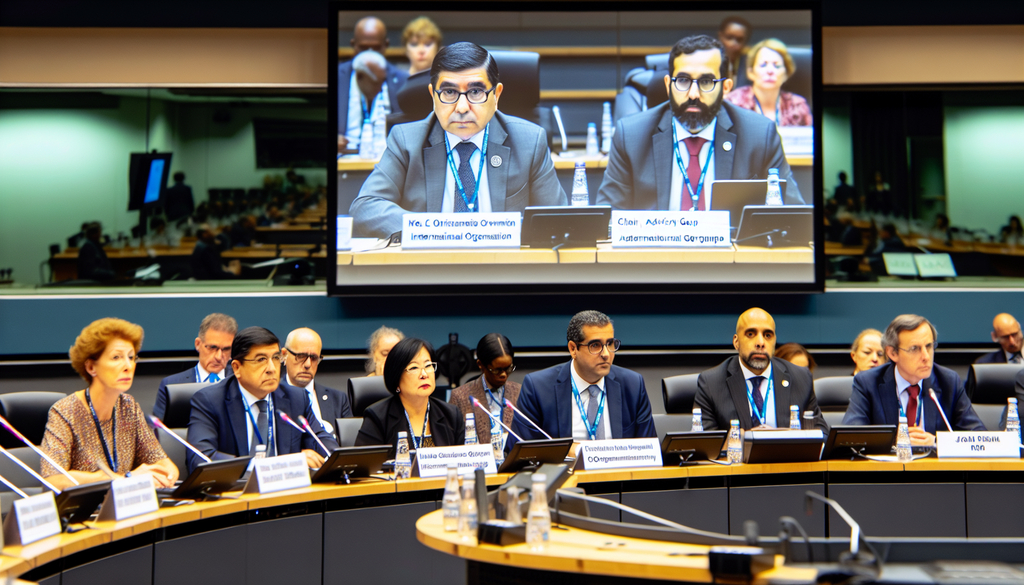Lawmakers gather for the World Health Assembly session

The Seventy-eighth World Health Assembly (WHA78) this year broke new ground with several pivotal announcements—most notably, the formal adoption of the Pandemic Agreement and a significant 20% increase in Member States’ Assessed Contributions or dues.
Building on the momentum of these decisions, the Assembly launched another milestone: the Global Parliamentary Dialogue at WHA, now an annual platform designed for parliamentarians to engage directly in discussions at the Assembly. Spearheaded by the Inter-Parliamentary Union (IPU), this forum reflects a growing consensus on the irreplaceable role of lawmakers in advancing health agendas through legislative oversight, budgetary influence, and advocacy at the national level.
“The WHO-IPU collaboration has been instrumental in highlighting how parliaments shape health outcomes and in creating this dialogue space at the Assembly,” said Martin Chungong, IPU Secretary-General, in his opening remarks. “With the historic adoption of the Pandemic Agreement at this WHA, the role of parliaments becomes key in driving ratification and national-level implementation,” he added.
WHO Director-General Dr Tedros Adhanom Ghebreyesus echoed this sentiment: “We deeply value our collaboration with the IPU and are pleased to inaugurate the Parliamentary Dialogue as a recurring feature of WHA. Your engagement demonstrates a strong commitment to equity and solidarity in global health.”
He continued, “Your presence affirms what we know to be true—health is a profoundly political issue, and parliamentarians are at the heart of shaping that discourse,” underlining their critical role in global forums like the WHA.
Chaired jointly by Hon. Christian Lohr of the Swiss Parliament, who also serves on the IPU Health Committee, and Elisa Scolaro, WHO’s Parliamentary Affairs Officer, the event convened lawmakers to discuss strategies for implementing WHA78 outcomes more effectively through legislative channels.
The session opened with remarks by Daniel Thornton, WHO Director of Coordinated Resource Mobilization, who stressed the importance of sustainable, flexible funding mechanisms. He noted that as financial gatekeepers, parliaments are essential in securing the investments needed for WHO to fulfill its mandate of universal health equity.
In a follow-up to the endorsement of the Pandemic Agreement, Dr Jaouad Mahjour, who heads WHO’s Intergovernmental Negotiating Body and International Health Regulations secretariat, emphasized the imperative for countries to ratify the Agreement promptly, enabling commitments to become actionable national policies.
During an interactive segment, Hon. Sobita Gautam from Nepal’s Federal Parliament and IPU Health Committee member, offered an insightful perspective on funding health systems and executing the goals of the Pandemic Agreement.
“We must deliver a consistent, urgent message when we return: investing in global health isn’t a luxury—it’s a necessity,” she stated. “Robust, equitable health systems not only serve national priorities, but fortify global stability, resilience, and dignity.”
Adding to this narrative, Katja Čič of the WHO Youth Council urged the inclusion of young voices in these high-level dialogues, asserting that youth participation is both essential and transformative.
“Youth involvement goes beyond symbolism. It is an essential piece of co-creating a better health future. This dialogue signifies a vital moment of collaboration across generations,” she remarked. “Policy should harness the potential of partnership—not just prepare for tomorrow but also empower today.”
The open discussion welcomed diverse contributions from representatives of countries like Guinea, Iran, Mauritius, Namibia, and Senegal, along with inputs from WHO's Civil Society Commission, the UNITE Network of Parliamentarians, the Global Fund, and the Global Sepsis Alliance. All voiced strong backing for shared leadership and accountability in global health action.
Beth Stinchcombe, representing the International Federation of Medical Students’ Associations (IFMSA), underscored the importance of action: “The Pandemic Agreement’s ideals will only materialize if backed by national laws and budgets. Inclusive, gender-sensitive policies and investments in the care economy must become the pillars of future health systems.”
Further emphasizing parliamentary duties, Hon. Mokhothu Makhalanyane, Chair of the Network of African Parliamentary Committees of Health (NEAPACOH), outlined critical roles parliaments should adopt. “Oversight, expedited legal domestication, and targeted financial allocation are vital for tackling public health challenges such as maternal health and noncommunicable diseases,” he said.
He added that despite reductions in official development assistance, partnerships like PMNCH hold promise to protect the welfare of vulnerable groups—especially women, children, and adolescents—within national development strategies.
As co-chair, Hon. Christian Lohr stressed the importance of continuity in legislative engagement, citing his prior involvement in shaping the 2019 IPU resolution on universal health coverage. “Past experiences reaffirm that leadership from legislatures is pivotal in preparing for health emergencies and advancing UHC goals,” he explained.
“We are committed to sustaining this momentum and broadening parliamentary inclusion in global health dialogues. Our collective aim is to ensure that legislative engagement in health governance becomes customary rather than exceptional,” he concluded.
Looking ahead, WHO and the IPU plan to roll out a number of initiatives designed to assist parliaments in transforming WHA directives into national realities. Countries are also encouraged to reinforce their support for WHO by including parliamentarians in their official delegations at upcoming Assemblies.
